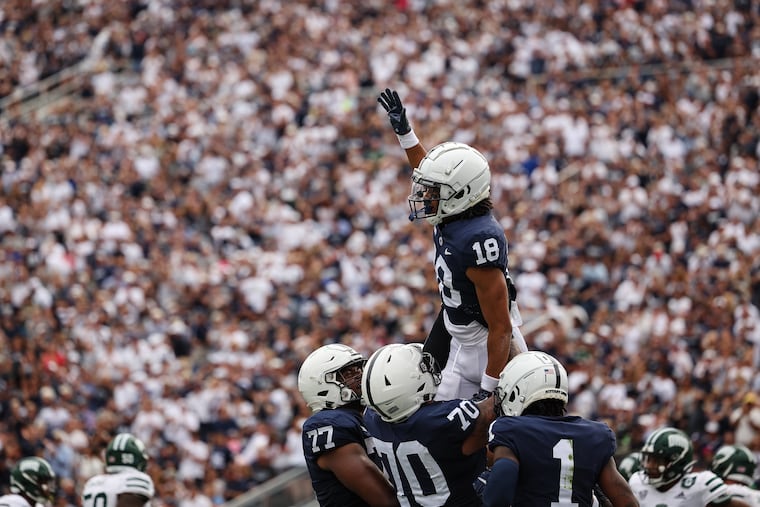Penn State approves a plan to sell beer at Beaver Stadium
It’s unclear when the first sips for sale will start — the athletic department said that’s still being finalized — though there has been talk that it could come as soon as Oct. 1.

Pssshhhhck. Ahhh.
It was a vote by a board of trustees rather than the opening of a can. But the result is the same. The ale shall flow.
Pennsylvania State University’s board of trustees Friday approved a plan to begin selling beer to the general public during home football games at Beaver Stadium, which can hold more than 100,000 fans. It’s unclear when the first sips for sale will start — the athletic department said that’s still being finalized — though there has been talk that it could come as soon as Oct. 1, when the Nittany Lions play the Northwestern Wildcats.
» READ MORE: You may soon be able to buy a beer at Penn State football games
“We have a tremendous external and internal team working on this and we are ready to implement it,” Penn State athletic director Pat Kraft told the board.
The move comes as Penn State athletics looks to improve the fan experience and raise revenue for maintenance projects at the stadium. Penn State said it expects the plan to yield a “seven-figure revenue stream” in the long term, though a loss is likely in the first year as the university invests in getting sales off the ground.
Penn State joins a growing group: More than half the universities in the Big Ten Conference, including Rutgers, already sell beer and, in some cases, wine, to the general public at their games. Most recently, the University of Iowa, which started selling the potables at its athletic facilities in 2021, got more than $1.1 million in commissions, according to a report from the school. Alcohol also is sold at Lincoln Financial Field during Temple University football games.
But the plan has drawn some concern.
Five of the 30-plus trustees voted no.
“Selling beer in the stadium will have a negative impact on the game day experience for families and in turn our future students,” said trustee Valerie L. Detwiler, a senior vice president at Reliance Bank.
The borough of State College in a statement said it was not consulted during the initial planning and only briefed on the plan by Penn State Intercollegiate Athletics last week.
“State College Borough Manager Tom Fountaine and Chief of Police John Gardner have concerns about the impact on the community and available resources this decision may have on the Borough of State College and surrounding areas,” borough spokesperson Kayla Lafferty said in a statement. “Alcohol is a factor in two-thirds of all crimes in State College. Like many other college communities, dangerous drinking is already a high concern.”
But Kraft and other Penn State officials said that alcohol-related incidents have gone down in venues that sell alcohol and that the university has sold alcohol in club and suite areas of the stadium since 2017.
“Why would we think people who sit in club seats can drink responsibly but the average fan can’t,” said trustee Brandon Short, a former Penn State and NFL football player, who voiced support for the plan.
Detwiler, however, countered that there were only 11 alcohol-related incidents at the last game and said trying to achieve a lower number wasn’t reason enough to start selling alcohol. She also said she was not swayed by the fact that more Big Ten colleges are adding alcohol sales.
“If your friend jumps off a cliff, would you jump too?” she asked. “This is not a decision that should be based on what peer institutions are doing. It should be based on what’s right for Penn State.”
The university allows alcohol sales at other venues, including Pegula Ice Arena. And the Bryce Jordan Center has been selling alcohol at non-university related events, such as concerts, since 2015.
Under Penn State’s plan, IDs will be scanned and wristbands issued, and alcohol sales will stop at the end of the third quarter. Two 16-ounce beers can be purchased at a time per person.
The university plans to add more than 300 employees to handle the oversight, rule enforcement, and operation of the sales. Vendors and employees will be trained and certified and must sell the alcohol at locations other than concession stands, the university said. Those attending the training will learn about “alcohol absorption rate factors and intervention techniques” to identify patrons who need help, the school said. Staff also will be instructed to report behavior violations.
Beer stations will not be located near student seating sections. The university also is planning a “Secret Shopper Program” that will feature deliberate attempts to break the alcohol-related rules and spot check for compliance. A task force with members of the campus community, Mount Nittany Medical Center, Penn State Health, local public service officials, and intercollegiate athletics will monitor the impact of alcohol sales on the campus and community.
The cost of the beer will range from $10 to $12, said Kristina Peterson, associate athletic director for strategic communications.
Penn State’s board also approved during Friday’s meeting a plan to ask the state for a 47%, or $115 million, increase in funding for 2023-24. University officials said the historic increase would bring Penn State on par with Temple and closer to other state and state-related universities in per-in-state undergraduate student funding. Penn State enrolls about 43,000 Pennsylvania undergraduates.